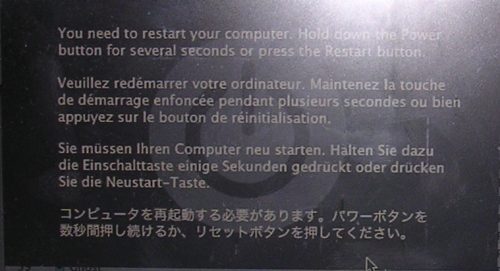Friday, January 28. 2005
The best IM client ever
Tuesday, October 26. 2004
iTunes Austria is online
Tuesday, July 6. 2004
"OSX less secure than Windows"
Sunday, March 7. 2004
First experiments with GarageBand
Monday, January 12. 2004
Building an iTunes-accessible Linux jukebox server
Friday, December 26. 2003
My weird mail setup
Monday, December 22. 2003
boehm-gc - don't use it on OSX!
Thursday, December 18. 2003
OSX puked on me! [for the first time]
Tuesday, November 11. 2003
OSX gets even more compatible
About Me

Andreas Krennmair, software engineer, open-source developer, currently living and working in Berlin, Germany.
Calendar
|
|
July '17 | |||||
| Mon | Tue | Wed | Thu | Fri | Sat | Sun |
| 1 | 2 | |||||
| 3 | 4 | 5 | 6 | 7 | 8 | 9 |
| 10 | 11 | 12 | 13 | 14 | 15 | 16 |
| 17 | 18 | 19 | 20 | 21 | 22 | 23 |
| 24 | 25 | 26 | 27 | 28 | 29 | 30 |
| 31 | ||||||
Quicksearch
Show tagged entries
22c3 23c3 amsterdam announcement apache argentina army austria beer berlin book borland bsd c c++ camera censorship cinema cms complaint concert cooking debian electronic music email eruby fail feedreader fefe food forced browsing fun gas mask gcc german germany git gnu golang google hacking history html http hype i18n imap internet israel job kaminer lecture linux linz mobile movie music network newsbeuter noos panorama pearl jam performance photo photography photos pictures polaroid police politics problem programming quiz rant recommendation release rss ruby screencast seagull security series server ska skabucks stfl terrorism travelling tv unix usa video vienna war weird wikipedia windows work wplotd youtube
Blog Administration
Links
Blogroll
• xkcd.com
• Planet Debian
• MY POV ([expect the unexpected])
• C skills
• Planet Erlang / Published News
• armstrong on software
• Photos from akrennmair
• Das Metalab informiert
• dive into mark
• /usr/local/bin
• F!XMBR
• heise online News (full feed)
• JLog
• SecuriTeam Blogs
• .:Computer Defense:.
• Riot Porn
• Chaosradio
• Radiomultikulti vom RBB: Russendisko unplugged
• AK's weblog
• The Recurity Lablog
• milw0rm.com
• seclog.de
• ilja's blag
• udo.kernecker.at - mein leben als prinzregent... ;-)
• grabnerandi.at diary feed
• Hilli's WebLog
• accidents waiting to happen
• Venzi's Weblog
• TaoSecurity
• Irrlicht3d.org
• murphee's Rant
• waiterrant.net
• grml development blog
• mutt Changelog
• nion's blog
• Wannabe Everything
• blog@bytelabs
• Knowledge Brings Fear
• Die wunderbare Welt von Isotopp
• Fefes Blog
• law blog
• mikas blog
• BILDblog
• GoogleWatchBlog
• Krone - Blog
• The Lunatic Fringe
• mp's blog
• Su-Shee 2.0
• Sex, Drugs & Compiler Construction
• Qbi's Weblog
• gedankensplitter
• Ohns Gehirnschleimschmiede
• fh
• Clifford Wolf's Blog
• AK's moblog
• Telepolis News
• Slashdot
• Newssystem von bundesheer.at
• Riding Rails - home
• Serendipity
• O'Reilly Ruby
• CCC Events Weblog
• del.icio.us/dubrider
• del.icio.us/timpritlove
• del.icio.us/ak
• del.icio.us/mika
• AK's Soup
• Friends of ak
• Astronomy Picture of the Day
• german-bash.org - Die neuesten Zitate
• QDB
• WeirdWeirdWorld Latest Feed
• I CAN HAS CHEEZBURGER?
• The Trailer Mash
• Cruel.Com
• fun.drno.de
• Peter Pilz grüner Sicherheitssprecher Österreich Wien
• NPD-BLOG.INFO
• INSM Watchblog
• Hitler-Blog
• Everybody loves Eric Raymond
• Dilbert
• Planet Debian
• MY POV ([expect the unexpected])
• C skills
• Planet Erlang / Published News
• armstrong on software
• Photos from akrennmair
• Das Metalab informiert
• dive into mark
• /usr/local/bin
• F!XMBR
• heise online News (full feed)
• JLog
• SecuriTeam Blogs
• .:Computer Defense:.
• Riot Porn
• Chaosradio
• Radiomultikulti vom RBB: Russendisko unplugged
• AK's weblog
• The Recurity Lablog
• milw0rm.com
• seclog.de
• ilja's blag
• udo.kernecker.at - mein leben als prinzregent... ;-)
• grabnerandi.at diary feed
• Hilli's WebLog
• accidents waiting to happen
• Venzi's Weblog
• TaoSecurity
• Irrlicht3d.org
• murphee's Rant
• waiterrant.net
• grml development blog
• mutt Changelog
• nion's blog
• Wannabe Everything
• blog@bytelabs
• Knowledge Brings Fear
• Die wunderbare Welt von Isotopp
• Fefes Blog
• law blog
• mikas blog
• BILDblog
• GoogleWatchBlog
• Krone - Blog
• The Lunatic Fringe
• mp's blog
• Su-Shee 2.0
• Sex, Drugs & Compiler Construction
• Qbi's Weblog
• gedankensplitter
• Ohns Gehirnschleimschmiede
• fh
• Clifford Wolf's Blog
• AK's moblog
• Telepolis News
• Slashdot
• Newssystem von bundesheer.at
• Riding Rails - home
• Serendipity
• O'Reilly Ruby
• CCC Events Weblog
• del.icio.us/dubrider
• del.icio.us/timpritlove
• del.icio.us/ak
• del.icio.us/mika
• AK's Soup
• Friends of ak
• Astronomy Picture of the Day
• german-bash.org - Die neuesten Zitate
• QDB
• WeirdWeirdWorld Latest Feed
• I CAN HAS CHEEZBURGER?
• The Trailer Mash
• Cruel.Com
• fun.drno.de
• Peter Pilz grüner Sicherheitssprecher Österreich Wien
• NPD-BLOG.INFO
• INSM Watchblog
• Hitler-Blog
• Everybody loves Eric Raymond
• Dilbert





